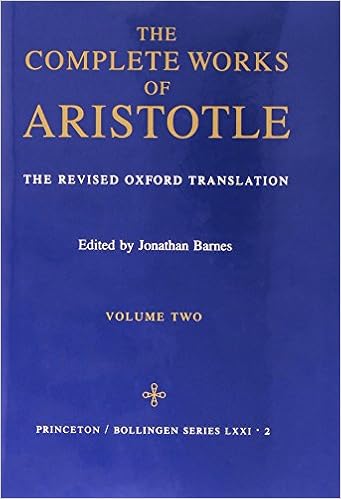
By Lucretius Carus, Titus; Konstan, David; Epicurus
ISBN-10: 1930972288
ISBN-13: 9781930972285
ISBN-10: 1930972571
ISBN-13: 9781930972575
Epicurus, and his Roman disciple Lucretius, held that the first reason for human sadness was once an irrational worry of demise. what's extra, they believed transparent knowing of the character of the area might support to get rid of this worry; for if we understand that the universe and every little thing in it truly is made of atoms and empty area, we'll see that the soul can't in all probability continue to exist the extinction of the physique -- and no damage to us can happen when we die. This freeing perception is on the center of Epicurean remedy. during this ebook, Konstan seeks to teach how such fears arose, based on the Epicureans, and why they persist even in glossy societies. It deals a detailed exam of the elemental rules of Epicurean psychology: displaying how a procedure according to a materialistic international view may supply a coherent account of irrational anxieties and wishes, and supply a remedy that might let humans to take pleasure in lifestyles to the fullest measure
Read Online or Download A life worthy of the gods : the materialist psychology of Epicurus PDF
Similar greek & roman books
Hans-Georg Gadamer's Beginning of Knowledge PDF
During this paintings Gadamer reminds us that philosophy for the Greeks was once not only a question of metaphysics and epistemology yet encompassed cosmology, physics, arithmetic, drugs and the complete achieve of theoretical interest and highbrow mastery. while Gadamer's ebook "The starting of Philosophy" handled the inception of philosophical inquiry, this e-book brings jointly the majority of his formerly released yet by no means translated essays at the Presocratics.
The Gorgias is a vibrant advent to relevant difficulties of ethical and political philosophy. In resolution to an eloquent assault on morality as conspiration of the vulnerable opposed to the powerful, Plato develops his personal doctrine, insisting that the advantages of being ethical continually outweigh any merits to be gained from immorality.
Read e-book online New Essays on Ancient Pyrrhonism PDF
Scholarship on historic Pyrrhonism has made super advances over the last 3 many years, thank you specifically to the cautious reexamination of Sextus Empiricus extant corpus. construction in this momentum, the authors of the 8 essays amassed the following learn essentially the most vexed and interesting exegetical and philosophical questions posed by way of Sextus presentation of this type of skepticism.
Download PDF by Aristotle: The Complete Works of Aristotle (The Revised Oxford
The Oxford Translation of Aristotle used to be initially released in 12 volumes among 1912 and 1954. it truly is universally famous because the ordinary English model of Aristotle. This revised variation comprises the substance of the unique Translation, a little emended in mild of contemporary scholarship; 3 of the unique models were changed through new translations; and a brand new and enlarged collection of Fragments has been further.
- Iamblichus of Chalcis: The Letters
- Krieger der Dämmerung (Die Magier 2)
- Heraclitus
- Etica
- David the Invincible: Commentary on Porphyry's Isagoge. Old Armenian Text with the Greek Original, an English Translation, Introduction and Notes
Extra info for A life worthy of the gods : the materialist psychology of Epicurus
Sample text
14 Thus, in the Letter to Herodotus (63–64) Epicurus writes: “one must hold firmly that the soul [psukhê] is most responsible for sense-perception [aisthêsis]. But [the soul] would not have aquired this [power] if it were not somehow enclosed by the rest of the aggregate. But the rest of the aggregate, though it provides for the soul this cause [of sense-perception], itself has a share in this property because of the soul; for it does not share in all the features which the soul has” (trans. Inwood and Gerson 1997: 13, modified).
For lupê is both in the pressures of the body and of the soul in its own right, just as pleasure is, but ponos is in the body only” (῞Οτι τῇ ἡδονῇ ἡ λύπη ἐστὶν ἐναντίον ἀλλ᾿ οὐ πόνος. ῾Ο μὲν γὰρ πόνος σωματικήν τινα θλῖψιν ἐμφαίνει, ἡ δὲ λύπη ψυχικὴν συστολήν…. ἡ μὲν γὰρ λύπη καὶ ἐπὶ ταῖς θλίψεσι τοῦ σώματος καὶ αὐτῆς τῆς ψυχῆς ἐφ᾿ αὑτῆς, ὥσπερ καὶ ἡ ἡδονή, ὁ δὲ πόνος ἐπὶ σώματι μόνον). On ponos = dolor and labor, cf. Cicero Tusc. disp. 35. 17 On the distinction between joy and pleasure, cf. Purinton 1993: 287–88; I disagree, however, with Purinton’s definition of khara as “the intentional state which has pleasure as its object” (292).
Giannantoni’s interpretation is facilitated by taking ἐνεργείᾳ as dative. Stokes 1996: 160 rightly notes that “it is difficult to resist the supposition that ἀταραξία and ἀπονία offer within the katastematic category a contrast of bodily and mental”; hence both body and soul have both kinds of pleasures. Despite Stokes’ doubts, this surely reflects Epicurus’ own view. But the contrast between khara and euphrosunê is, Stokes says (161), obscure: the latter should, in the context, refer to kinetic bodily pleasure or hêdonê, and I do not doubt that it does, even though the term is not clearly so restricted in the Epicurean texts we have.
A life worthy of the gods : the materialist psychology of Epicurus by Lucretius Carus, Titus; Konstan, David; Epicurus
by George
4.3



